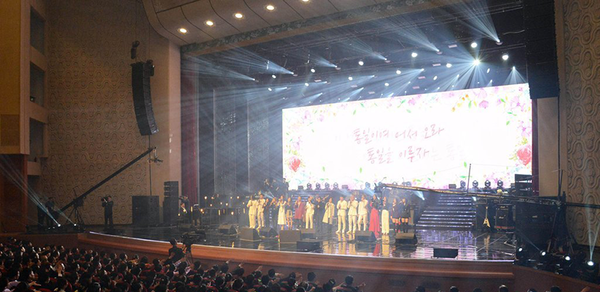As North Korean state media broadcasts images from Sunday’s performances by South Korean K-pop musicians at the East Pyongyang Grand Theatre, a blinding contradiction emerges: If such material is strictly prohibited at all other times within the heavily-censored country, why is Kim Jong Un shown unabashedly enjoying their performances?
North Korea’s Party-run publication Rodong Sinmun published an image of Kim Jong Un posing with eleven South Korean music acts, including Red Velvet, Cho Yong Pil, and Choi Jin Hee on the front page of the April 2 edition – the day following the performance. State television station ‘Korean Central Television’ (KCTV) also aired select scenes from the performances and extended scenes of Kim greeting and shaking hands with the South Korean visitors.
As a result, it is likely that the population – already familiar with South Korean music – will be interested in the fact that Kim Jong Un endorsed the event with his attendance and personally met with the artists.
Daily NK interviewed two defectors including a former resident of Pyongyang (Kim Chol Min) and a former Ryanggang resident (Ms. Choi, pseudonym) to hear their opinions on how they think North Koreans are likely reacting.
This interview has been edited for clarity and brevity.
Daily NK (DNK): How do you think North Koreans reacted after hearing about the performances through state media?
Kim Chol Min (Kim): I think they will be feeling a “taste of unification,” and perceive Kim Jong Un as opening up a bit.
DNK: What do you mean by “opening”?
Kim: It used to be that straying even a little from the strictly-controlled norms of a performance was considered an ‘anti-revolutionary’ crime. But now I think things have changed a bit. The performances and the attire of the artists this week were unprecedented and would have been unimaginable under Kim Il Sung or Kim Jong Il.
DNK: It’s illegal for North Koreans to view or listen to South Korean media, but then there is Kim Jong Un attending a K-pop performance in Pyongyang. How will North Koreans view the contradiction?
Ms. Choi (Choi): Reactions will vary. First, those who have been unable to get their hands on South Korean material in the past may not feel anything particularly negative about the news. The country has been under the same system for over 70 years now, after all. The idea that ‘he is the leader and we are just the subjects’ is well-ingrained in the minds of most of the population, who won’t question why Kim Jong Un can view the performance and they can’t. So as society has been separated into the elites and the ordinary people, many may not be having these kinds of thoughts.
But as foreign information and materials have made their way into the country over the years, some may think differently. Some might complain, asking, ‘Why do only those in Pyongyang have this opportunity?’ There will likely be questions as to why South Korean music and dramas have been so strictly prohibited, especially since Kim Jong Un recently intensified the nationwide crackdown on “Hallyu” (South Korean media).
So people may now begin to dream of an end to the restrictions after seeing Kim Jong Un and his wife Ri Sol Ju meeting with the South Korean pop stars. These reports will probably inspire some excitement and anticipation for change among the people.
DNK: Will the South Korean songs performed in Pyongyang this week become popular in North Korea now?
Kim: The songs will soon spread. They may try to control it, but they will not be able to completely stop it, just as in the past. For one performance, the authorities told everyone to keep quiet about what they saw, but then the song “To J” (by South Korean artist Lee Sun Hee) became widely popular anyway. Especially because it’s a good way to make money, in a couple of months you will see merchants selling CDs advertised as having “music from the South Koreans who performed in Pyongyang.”
DNK: How do people in North Korea listen to South Korean music so much if it’s strictly prohibited?
Kim: Well yes, a lot of people listen to it, but many do not know that the content is actually South Korean music. So it’s hard for the authorities to catch this. For instance, many people like to sing these songs, but how can there be a crackdown on that? Although people are told through official lectures that it is forbidden to sing South Korean songs, they end up inadvertently singing them anyway.
Choi: That’s right. As my nephew headed out for his army service around 2008 or 2009, he was singing “A Letter from a Private” by Kim Kwang Seok, and I thought to myself, “That’s a good song,” but I didn’t even realize that it was South Korean.
DNK: How do people in North Korea typically listen to music these days?
Kim: These days, even ordinary people can have computers in their homes. So they use these to listen to music on DVDs. They also listen to MP3s through their mobile phones, and since most phones have bluetooth, they are able to share songs that way. Another way is through USB or SD memory cards. The spread of music across the country has been quite fast due to these technologies.
I hope that after the performances in Pyongyang by South Koreans this week, North Koreans will have more opportunities to hear this kind of music and that it will help bridge the gap between the minds of the two peoples.





















